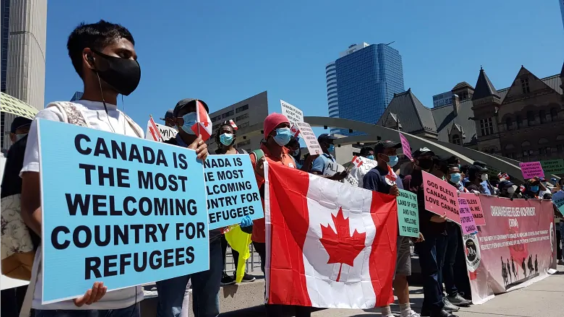Canada has introduced a new humanitarian pathway for immigration, offering a crucial alternative to irregular migration for citizens of Colombia, Haiti, and Venezuela. This initiative is a response to the significant surge in irregular migration through Central America, leading to heightened concerns of migrant smuggling, physical insecurity, and exploitation.

This innovative pathway aims to welcome 15,000 people from the Western Hemisphere. It provides pre-arrival services, including employment skills assessment and referral to settlement service providers in their communities. Those who qualify may also be eligible for transitional financial assistance through the Resettlement Assistance Program.
Who is Eligible to Apply?
The new immigration pathway, announced on November 17, 2023, by Marc Miller, Minister of Immigration, Refugees and Citizenship Canada (IRCC), is now open for applications. To qualify, applicants must meet specific requirements:
- Hold Colombian, Haitian, or Venezuelan citizenship
- Reside in Mexico, Central or South America, or the Caribbean
- Be a spouse, common-law partner, child, grandchild, parent, grandparent, or sibling of a Canadian citizen or permanent resident capable of supporting the application (referred to as an “anchor”)
- Intend to reside outside of Quebec
- Possess a valid passport or eligible travel or identity document
Who is Eligible to be an “Anchor” and Support their Relatives?
To qualify as an anchor, you must be a Canadian citizen or permanent resident aged at least 18, living in Canada outside of Quebec. Anchors should meet specific criteria, including:
- Not be held in any penitentiary, jail, reformatory, or prison.
- Not have been convicted in Canada of murder or an offence listed in Schedule I or II of the Corrections and Conditional Release Act or an equivalent offence outside Canada. This applies irrespective of whether it was prosecuted by indictment if less than five years have passed since your sentence’s completion.
- Be free of any default on sponsorship undertakings or court-ordered support payment obligations.
- Not owe any debt referred to in subsection 145(1) of the Immigration and Refugee Protection Act, payable to His Majesty in right of Canada.
- Not be a bankrupt who has not been discharged under the Bankruptcy and Insolvency Act.
- Not be receiving social help for motives apart from disability.
- Have now no longer accepted, and recognize you aren’t to accept, any monetary reimbursement from the overseas countrywide and their accompanying own circle of relatives members.
Anchor Responsibilities
As an anchor, you must support the applicant and their family to settle in Canada for one year.
Your duties include meeting the applicant upon arrival, helping them find a home, ensuring they have necessities like food and clothing, and introducing them to Canadian life, such as public transport, banking, shopping, and their rights.
You will assist the applicant in understanding information and setting up essential services. This includes helping them open a bank account, enroll in provincial and federal programs, apply for a Social Insurance Number, and get health care coverage.
You will also help them find a family doctor, dentist, and optometrist, address other medical needs, enroll children in school, and assist them in accessing employment-related services and settlement services from service provider organizations, who can provide language training and other information about life in Canada.
Colombian, Haitian, and Venezuelan Nationals Can Also Come to Canada as Foreign Workers!
For those not eligible under the new immigration pathway, Colombian, Haitian, and Venezuelan nationals can still come to Canada as foreign workers. An additional 4,000 individuals can be accepted through existing temporary worker programs, such as the Seasonal Agricultural Worker Program and the Economic Mobility Pathways Pilot. These initiatives aim to alleviate migration pressures within the Western Hemisphere, providing a viable option for those heading north irregularly.
Moreover, Canada will invest $75 million over six years in projects across Latin America and the Caribbean. This investment seeks to strengthen asylum capacity and better integrate migrants and refugees into local communities and labour markets. These measures underline Canada’s commitment to supporting those displaced due to political, social, and economic instability, creating long-term solutions that foster stability and prosperity in these regions.
Maple Land Immigration Services: Your Partner in the Immigration Journey
Embarking on the immigration process can be complex, but Maple Land Immigration Services is here to assist you at every step. Our experienced team offers comprehensive immigration support, ensuring a smooth transition for you and your family. Contact us today to explore how we can make your Canadian dream a reality.

